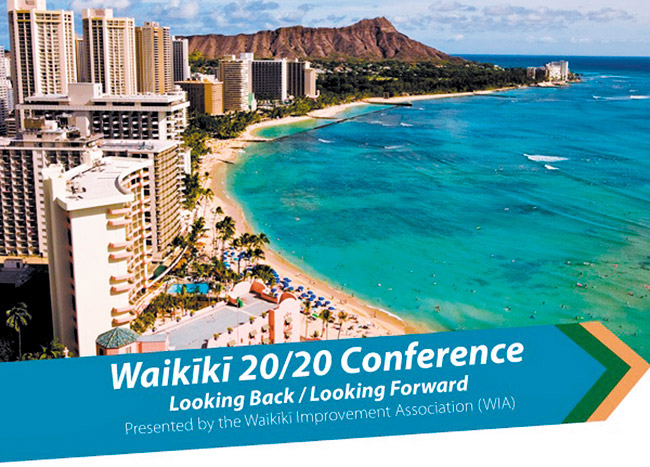Waikiki Then, Now And Future
Twenty years ago, Waikiki Improvement Association (WIA) convened the Waikiki 20/20 Conference, drawing the participation of government, residents, businesses and others in our community. The association’s goal was to develop planning recommendations for the future of Waikiki, the engine that drives the state’s tourism industry and a major residential area.
WIA reached out to its many partners in the ensuing years, including the City and County of Honolulu, in pursuit of those recommendations. During my terms as councilman and mayor, the city collaborated on the Waikiki Special District designation that paved the way for the redevelopment of Beach Walk and ongoing revitalization of aging hotel properties elsewhere. We worked together through the Department of Planning and Permitting to change an ordinance so retailers and restaurateurs could post better signage. We joined with WIA to sponsor the Sunset on the Beach events and to introduce a major hula conference through the Mayor’s Office of Culture and Arts. And we worked long and hard to ensure the continued safety of our visitors and residents through the city’s first responders.
WIA has come a long way. Now, looking back on the past two decades and the remarkable transformation of Waikiki, the association again is embarking on an assessment of its accomplishments and charting a course to sustain and bolster Waikiki’s role as the cornerstone of Hawaii’s economy over the next two decades: 20 years back, 20 years forward.
In order to create this plan for the future, WIA is following up on the Waikiki 20/20 Conference by interviewing Waikiki stakeholders and seeking input from the community. I totally endorse this process, as I have always been a huge proponent of community-based planning. This combined input will serve as the foundation for a plan of action to be completed by the end of this year.
WIA wants to know what you think about the Waikiki of today: What’s good? What needs improvement? Among the general topics to be explored will be the Hawaiian culture, Waikiki Beach, public spaces, accessibility and mobility, accommodations, dining and retail options, workforce needs, and environmental and energy sustainability.
More specifically, with regard to Hawaiian culture, should Waikiki have more Hawaiian music, hula performances, sports events, historic markers or statuary? The people who work in Waikiki are critical to its success; should there be more Hawaiian culture and history training, or are there other topics that need attention? Should we have an ongoing beach maintenance program? Should Waikiki Beach be restored to historic levels? How is homelessness affecting the area, and is the housing-first approach a good one? Do we need to do more to protect public spaces? How about parking, pedestrian pathways or bike paths?
Does Waikiki need more hotel rooms? What about timeshare or condo hotels as the only means of financing more visitor accommodations? Does Waikiki need more retail, dining and entertainment attractions?
WIA is soliciting opinions from one and all. Folks can email their ideas to mail@waikikiimprovement.com, or mail them to Waikiki Improvement Association, 2250 Kalakaua Ave. Suite 405-2, Honolulu, HI 96815.
WIA’s effort is being led by Rick Egged, its longtime executive director, with the solid support of its board. Rick was one of the deputy directors of the Hawaii Department of Business, Economic Development & Tourism when I headed it. In fact, DBEDT was at the forefront of some state-driven tourism summits back then. I know his planning insights and industry experience will result in a sound and thoughtful road map that, hopefully, will serve us well into the future.
Waikiki 20/20 is an important exercise. The recommendations from this conference will guide and shape the direction of Waikiki, the visitor industry, our economy and the quality of life for the residents for decades to come. That’s why it’s critical that stake-holders and community alike get involved and contribute their ideas and insights to this worthwhile endeavor.






